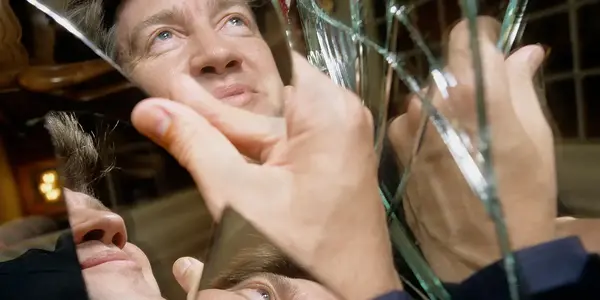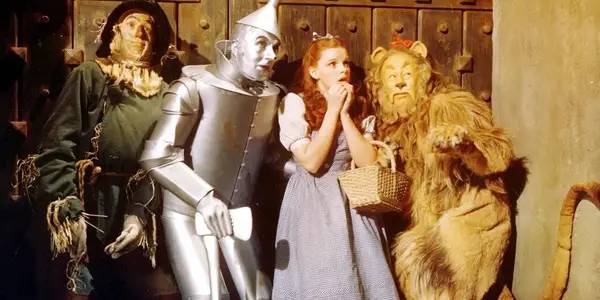LYNCH/OZ: I Don’t Know Where We’re Going

Soham Gadre is a writer/filmmaker in the Washington D.C. area.…
I felt like I was back in college watching Alexandre O. Phillippe’s Lynch/Oz, but having retained all of the knowledge about the filmmaker, his films, and cinema in general through the decades. I guess if you’re going to make an essay film about one of David Lynch’s most overt and axiomatic reference points then you have to kind of gear it towards people who don’t really know much about him, or at least, people who’ve seen some films but only scratched the surface of their own thoughts about them.

Lynch/Oz is a very film 101 documentary, one which aims to open doors… uh… curtains for the performer, lover, and cinema enigma that is Lynch. It doesn’t aim to give answers but provides a variety of view-points that dissect the imagery and connections between words, frames, and actions that paint the indelible influence of Victor Fleming’s The Wizard of Oz on Lynch’s oeuvre. But it doesn’t, and simply can’t by virtue of its subject matter, dig deep.
Come For John Water & Karen Kusama
I will give Phillippe some credit, he did get two absolutely spectacular narrators for two of the chapters of this film – John Waters and Karyn Kusama. They both easily distilled the most insightful parts of Lynch, the way he makes us feel, over the connective tissue of imagery that harkens or recalls back to a particular movie or cultural artifact of Americana. Kusama especially breaks down Mulholland Drive in a vein similar to Melissa Anderson’s incredible tome on Inland Empire, where the evocation of multiple dimensions and mixtures between dreams and reality in and of themselves aren’t the story, but the way that we perceive these differences as we watch the films that tell the story. The most remarkable moment of the documentary comes in the moment when Kusama talks about how Lynch, even in the darkest reaches of Mulholland Drive envisioned characters as having a ‘best version’ of themselves.
We’re Not Going Anywhere Special
Unfortunately, these sort of personal evocations, that stem purely from a notion of sense given through watching a Lynch movie, or in the cases of Kusama and Waters, having met and briefly known the man himself, is few and far between.

Much of the documentary invites you on the sort of theme park lecture ride that they give in Jurassic Park when they explain the process of extracting DNA from mosquitoes trapped in amber and turning them into dinosaurs. It’s nice and informative but be warned that if you are someone who has had even an intermediate exposure to Lynch, this film isn’t going to take you realms un-encountered.
Conclusion:
One of the reasons why films like Room 237 fascinate me more than stuff like this, and also understandably frustrate most film nerds, is that it is unabashedly speculative, grasping at straws, and psychotically obsessive in the ways it purposefully digs so deep into the trenches it’s only unearthing hallucinations. The value of that kind of movie is it forces you to believe absolute hogwash. Lynch/Oz on the other hand does the opposite. It tries to tip-toe and sneak its way into saying things about Lynch’s films while continuously undermining itself. Thus, it must rely on the One Perfect Shot or ‘Cinematic Parallels’ connections it forces between movies, creating somewhat of an embarrassing and shallow portrayal of Lynch. This reminds us of that, oh, and that reminds us of that other thing! But it may all be just a coincidence… It’s rather ironic, considering Lynch’s entire oeuvre is filled with these sorts of trails and patterns of numbers, objects, and names that go absolutely nowhere and leave you to question how you got lost. Oftentimes, the narrators need to backtrack, to assure the audience that what they’re explaining may not have the weight or significance this film suggests after all. Well, then, why watch?
Lynch/Oz was released nationwide in U.S. theaters on June 2nd, 2023
Does content like this matter to you?
Become a Member and support film journalism. Unlock access to all of Film Inquiry`s great articles. Join a community of like-minded readers who are passionate about cinema - get access to our private members Network, give back to independent filmmakers, and more.
Soham Gadre is a writer/filmmaker in the Washington D.C. area. He has written for Hyperallergic, MUBI Notebook, Popula, Vague Visages, and Bustle among others. He also works full-time for an environmental non-profit and is a screener for the Environmental Film Festival. Outside of film, he is a Chicago Bulls fan and frequenter of gastropubs.












